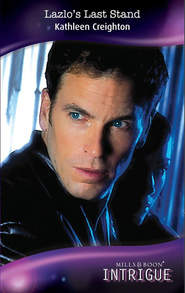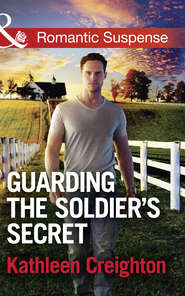По всем вопросам обращайтесь на: info@litportal.ru
(©) 2003-2025.
✖
The Top Gun's Return
Автор
Год написания книги
2019
Настройки чтения
Размер шрифта
Высота строк
Поля
She’d told him the truth about her age before she’d left him to go back home, though, because by that time she’d known she was going to marry him one day. She hadn’t known, then, that less than three weeks after her high school graduation she’d be Mrs. Tristan Bauer, wife of a naval aviator, and already well on her way to being someone’s mother.
“Ma’am?” The gray-haired, bespectacled naval officer in the front passenger seat broke his respectful silence, turning his head and leaning slightly in order to make eye contact. “We’ll be taking you directly to the residence, which is adjacent to the medical center where your husband is receiving treatment. After you’ve checked in, I can take you to see him there, or you can wait for him in the residence, if you like. Lieutenant Bauer should be cleared to join you shortly. Whichever you prefer.”
His manner was deferential to the point of awe, which Jessie found disconcerting. “Thank you, Lieutenant Commander—” She searched her befuddled memory for her casualty assistance officer’s name and came up empty. Exhausted by the effort, she was about to fall gratefully back into the cocoon of her own musings when the expectant look on the officer’s face registered on her consciousness. He was waiting for her decision. Her forehead tightened as she struggled with it; any logical, reasoning thought was hard work for her today. And this—whether to meet her husband, returned from the dead after eight years, for the first time in the cold antiseptic environment of a hospital room with doctors and nurses all around, or confront him alone in privacy, this man she’d loved and given up for lost long, long ago, now a stranger to her—seemed utterly impossible. Which was better? Or worse?
For better or worse…in sickness and in health.
She tried to smile for Lieutenant Commander—Rees, she remembered now. Rees-with-two-es, he’d told her. “How are these things usually handled?” She thought of the return of the captives taken during Desert Storm, of television pictures of gaunt men in flight suits engulfed in loved ones’ embraces while flags waved and bands played “Tie a Yellow Ribbon ’Round the Old Oak Tree.” She’d been active in the wives’ support group on the base at the time and had worn a bracelet with a POW’s name engraved on it.
The Lieutenant Commander’s military bearing melted into a smile of pure irony. “Ma’am, there isn’t any precedent for what happened to your husband. As far as the Navy’s concerned, you can have this just about anyway you want it.”
Jessie nodded, too distracted to return the smile. The representative of the Defense Department who’d taken charge of her in New York had said much the same thing: There was no protocol for resurrection. There’d been no yellow ribbons or POW bracelets for Tristan. No support groups or letter-writing campaigns petitioning for his release. For all intents and purposes he’d been abandoned, forgotten, given up for dead, and the country he’d served and sacrificed eight years of his life for now seemed eager—almost desperate—to make amends.
Which was no doubt why Tristan’s somewhat unusual request to stay in Germany for part of his treatment and recovery period rather than being sent home to the States as soon as he was deemed fit to travel had immediately been granted. So had his request that his wife be allowed to join him, rather than wait at home for his return. Jessie had been given the choice of waiting in New York for Tristan’s phone call or taking the next flight to Germany. She’d chosen the flight, and had been whisked off to the airport by her DOD assistance officer, one jump ahead of the media stampede.
It had been decided that Sammi June would stay and wait with her grandma Betty and the rest of the family back home in Georgia. Jessie wasn’t sure who had made that decision, but she knew it was the right one. She’d been told Tristan was still very weak and sick, and she knew he wouldn’t want Sammi June to see him like that. Not to mention that she was mightily glad not to have Sammi June’s emotional baggage to deal with right now. Her own was burden enough.
Morning was only beginning to thin the darkness when Sammi June slipped out of bed. She made little effort to be silent; her roommate slept like the dead and was snoring peacefully, as always, an arm’s reach away in the tiny University of Georgia dorm room they’d shared since last September. Sammi June hadn’t slept at all, peacefully or otherwise, since Gramma Betty’s phone call yesterday afternoon.
Baby girl, your daddy’s alive.
Baby girl. Nobody had called her that in years, not since her dad had gone away to fly F-16’s over Iraqi deserts, eight years ago. Daddy had still called her his “baby girl,” then, even though she’d been ten years old at the time. Would he still call her that now, she wondered, even though she was no baby, hardly even a girl? She was eighteen, an adult in the eyes of the law, old enough to vote and get married without permission and be responsible for her own choices. A grown woman.
Although she didn’t feel the least bit like one at the moment.
Uncaring of the morning chill, wearing only the boxer shorts and tank top that served her as pajamas in all seasons, she slumped into the hard-backed chair at her study desk beside the window and fingered apart the blinds. Out there on the still-slumbering campus the other buildings were dark shapes, street and yard lights blurred and haloed by a thin gauze of fog. Flowering trees were beginning to take lacy form among the darker grays of azaleas and new-leafed trees. Stars were few, pale pinpricks in the lavender sky. Search as she might she couldn’t locate the Evening Star, the one she’d wished on so many times, all those years ago.
Starlight, star bright,
First star I’ve seen tonight,
I wish I may, I wish I might…
Anger surged unexpectedly, trembling through her, stinging behind her nose and eyes. I wish my daddy would come home. How many times had she wished that when she was little? Wished it so hard sometimes it felt as if all the cells in her brain were vibrating, as if her head might explode. And…nothing.
Instead one day they’d told her her dad was dead, that he wasn’t ever coming home again. She hadn’t believed them. She’d begun to wish on the Evening Star again, a different wish this time. I wish my daddy would be alive. And still nothing. For eight years.
Nothing. How angry she’d been, deep down inside where nobody could see it, angry with her dad for leaving her, for not being there when she needed him to see her in her class play, to cheer at her soccer games, congratulate her after speech tournament victories, walk her across the field when she was elected Junior Homecoming Princess. To comfort her when she had to get braces, and when she’d missed being selected for the freshman cheerleading squad. How angry she’d been, though she’d never let anybody see it, not even Momma.
And now? Now that she was practically grown-up and didn’t really need parents anymore, it seemed all those pathetic little-girl wishes had finally been granted. Her dad was alive. He was coming home. Was God playing a joke on her? She didn’t know how she was supposed to feel.
The blinds clanked softly as they slipped back into place, and a tear left its silky track down Sammi June’s cheek.
Jessie’s fingertips stroked the image in the snapshot album she held in her lap—Sammi June, in her ball gown, head held high and tiara gleaming, radiantly smiling against the backdrop of an indigo sky. So lovely, so grown-up at not quite seventeen, and in her high heels already almost as tall as her escort, her uncle Jimmy Joe. And, Jessie remembered, she’d even managed to look graceful during that walk across the football field, in spite of high heels that kept punching into the damp turf.
A young woman. Would Tris even know his daughter? She’d been a knobby-kneed tomboy in ponytails when he’d seen her last.
The image blurred and wavered inside its protective plastic envelope, and Jessie hurriedly blotted her eyes with the sleeve of her heather-gray blazer. Her hand lingered there, lightly pressing her cheekbone…her temple, smoothing back wisps of hair. There was gray in those wisps now, that hadn’t been there eight years ago. She’d changed a lot—lines at the corners of her eyes and around her mouth…her neck. Her breasts weren’t as firm, her belly a bit more rounded. I’ve changed. Will he know me?
Lieutenant Commander Rees was waiting politely for her reply.
“I think—” Her voice shook and she drew a breath to steady it. An image rose in her memory of the only other time she’d ever seen Tris in a hospital bed, pale and groggy after the surgery to set the fractured leg that had grounded him during Desert Storm. It was the only time she’d ever seen him vulnerable and helpless. He wouldn’t want her to see him like that again. “I think Tristan would rather I waited for him at the residence. He’s never been crazy about hospitals.”
She struggled to produce a smile for the officer before turning to gaze, unseeing, upon the German countryside.
He’s been like that—vulnerable and helpless—for eight years, the man I knew and loved for his strength, his pride, and yes, even his arrogance. What did they do to him? How did he survive, all those years? How could he survive, without being irrevocably changed? Will I know him?
Butterflies danced and shivered inside her, and she thought, Yes. That’s where the biggest changes will be, in both of us. There, deep inside.
Chapter 2
The guest residence had been privately built by a nonprofit foundation to accommodate the families of military personnel undergoing treatment at the medical facility. It was an imposing structure of stone and slate made hospitable by the boxes filled with tulips, daffodils and hyacinths that adorned every window. As Tristan drank in the sight, the lump that seemed never far away these days came back into his throat. It had been a long time since he had seen daffodils.
The sedan in which he was riding, a modest Mercedes, rolled to a stop beside the building’s main entrance. Its driver, a young airman whose name Tristan could not remember, got out and came around to open his door for him.
The man sitting beside him in the back seat touched his arm. Al Sharpe, the air force major assigned as his escort, or “shadow,” asked quietly, “Would you like me to see you inside?”
“Thanks, I’ll take it from here.” Tristan’s attention was engaged with employing the cane he’d been given to lever himself out of the car. He wasn’t happy about the cane, but the knee he’d injured punching out of his exploding Hornet eight years ago never had healed properly, and the unaccustomed activity of the past few days seemed to have aggravated it. The doctors had told him that, with good physical therapy and possibly some surgery, he’d likely get most of the use of it back. Eventually.
Most of it. Eventually. He wondered what that meant, and whether it applied to other things he’d lost. Eight years with his wife…watching his little girl grow up. The person he’d been. Nobody was ready to assure him so easily and carelessly about his chances of getting those things back.
Upright, he flashed Major Sharpe his out-of-practice smile. “This is one mission I’d like to fly solo, if you don’t mind.”
“I understand. We’ll be back here for you at twenty-one hundred hours, then.” He paused to hold Tristan’s eyes for a long moment. “Remember what I told you—don’t expect too much of yourself. One step at a time. And meanwhile, if you need anything, you just give me a call.”
“I will. Thanks. I’ll be okay.” He nodded at the airman, who saluted briskly, then shut the door and got back in the car.
As he watched the Mercedes drive away it occurred to Tristan that for the first time in nearly eight years he was on his own. Completely alone. Unsupervised. It was a strange feeling. He turned and made his way slowly along the walkway to the door, thinking about the fact that those limping steps were his first without an escort since he’d regained consciousness in an Iraqi desert to find himself surrounded by gun-toting soldiers with hatred in their eyes.
A cold, sick feeling washed over him. He knew the feeling well; he’d lived with it in many forms, the past eight years. Fear. Strange, he thought, I’m about to see and touch the one person I dreamed of seeing and touching for all those years…the one whose face and voice in my dreams I think at times were the only thing keeping me alive. And I’m scared to death.
At the door he paused, turning to let his gaze sweep once more over the parking lot and the new-leafed trees and red-tiled roofs beyond. The sky was overcast, the sun breaking through the clouds in rays, like fingers. Beside the walkway, planters bright with more tulips, daffodils and hyacinths gave off a heady scent. The air was cool and seemed thin and light in his lungs. So different from prison air, which was thick and heavy. Prison air weighed a man down.
I don’t know who I am, after breathing that air for so long, he thought. I know I’m not the same man I was when I left her. Nowhere near.
And he let them come, then, the questions he’d tried so hard to hold at bay: Will she love me still? Will she want this man—this shell—that I’ve become?
He closed his eyes and filled his lungs with the scent of flowers, and from long habit, her image came to fill the blank screen of his mind. Jessie’s face, so vivid he felt as if he could reach out and touch it, every detail etched in his memory as if in stone. Her lips, curved up at the corners, and her nose, crinkled across the bridge with her smile…
But she’ll have changed, too, he reminded himself. They’d warned him to expect that. In eight years, how could she not have changed? And yet—he caught a quick sip of the winey air, as if to give himself courage—she hadn’t remarried, they’d told him. Why, when she’d been told he was dead? Did that mean— What did it mean? It could mean everything. It could mean nothing.
He realized his heart was pounding so hard it was making his chest hurt. He rubbed the spot ruefully as he reached for the door handle. Whatever it was waiting for him beyond that door, postponing it wasn’t going to make it easier to face.
For the life of her, Jessie couldn’t make a simple decision. She’d spent what seemed like hours deciding what to wear, not that that was an unheard-of thing for a woman, but it hadn’t ever been a particular problem for her before. She wore wash-and-wear pants and smocks for work, jeans and sweatshirts or shorts and T-shirts or tank tops at home, depending on the season of the year, and when something more sedate was required, dressy slacks and a blazer, with a sweater or shell, again dictated by the season and the weather. She owned a couple of dresses, basic and eternal in style, which were pretty much reserved for weddings and funerals. What was to decide?
Today, though, she’d stood before the mirror in her room for what seemed like hours, helpless and on the verge of panic. Nothing looked right to her. The blazer she’d worn on the plane seemed too formal, too stiff. The sweater she’d finally chosen was lavender, which used to be Tris’s favorite color. Was it still? Would he remember? Was she trying too hard? Had she put on a few pounds? God, she thought, I look old.
And her hair. She hadn’t had time to shampoo and blow it dry. Should she wear it loose on her shoulders anyway, the way she knew Tris preferred, even though it was definitely looking limp and travel weary? And the gray mixed in with the blond at her temples—oh God, he’d have to be blind not to see that, no matter how she wore it.











